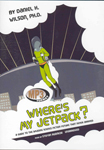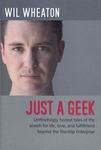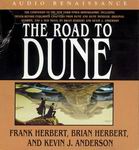
 Where’s My Jetpack?: A Guide To The Amazing Science Fiction Future That Never Arrived
Where’s My Jetpack?: A Guide To The Amazing Science Fiction Future That Never Arrived
By Daniel H. Wilson, PhD; Read by Stefan Rudnicki
1 MP3-CD – 3.5 hours – [UNABRIDGED]
Sample: Click here
Publisher: Blackstone Audio
Published: 2007
ISBN: 078617160X
Themes: / Science Fiction / Non-fiction / Technology / Teleportation /
The future is now. And we are not impressed. The future was supposed to be a fully automated, atomic-powered, germ-free Utopia, a place where a grown man could wear a velvet spandex unitard and not be laughed at. Our beloved scientist may be building the future, but some key pieces are missing. Where are the ray guns, the flying cars, and the hoverboards that we expected? We can’t wait another minute for the future to arrive. The time has come to hold the Golden Age of science fiction accountable for its fantastic promises.
Finally, someone has come to take the Golden Age of science fiction to task for all that crap they told us would happen. Who is the hero that’s going to demand our cool stuff? None other than Daniel H. Wilson, PhD, that’s who. That’s right. The guy who saved us from all those robots in his previous book – How to Survive a Robot Uprising. (SFFaudio Review here – we’re on the ball with all this surviving stuff.)
Just like in How to Survive a Robot Uprising, Wilson takes real science facts and gives them to us in a way that will make you laugh out loud. For example, what about those jetpacks we were promised? (Wilson calls the jetpack the “Holy Grail of classic science fiction technology.”) In this book, we find out that Wendell Moore finished the Bell Rocket Belt in 1961. It was basically a rocket mounted to a backpack. He tested it himself. Yes, he strapped a rocket to his belt, and turned it on. We learn exactly how it worked, hydrogen peroxide fuel and all. It produced 300 lbs of thrust – just enough to get a grown man off the ground. The downside? It could only hold 30 seconds worth of fuel. Shockingly, none of the rocket pack pilots died. Wilson then laments the lack of serious innovation in the rocket pack industry since then. “If Wendell Moore could see the state of jetpacks today,” says Wilson, “he would be doing barrel rolls in his grave.”
Jetpacks are just the tip of the rocket. Orbital hotels, robot servants, space elevators, teleportation – it’s all in there.
Stefan Rudnicki delivers another quality narration. One of Wilson’s goals with both of his books was to take the material so seriously that absurdity shows through. Rudnicki understood this, and provided narration to match. Funny stuff.
To hear from the author himself about Where’s My Jetpack?, How to Survive a Robot Uprising, robotics in general, and future projects, check out his interview on the Talking Robots podcast, July 5, 2007 edition. Here’s the direct link to the MP3.






